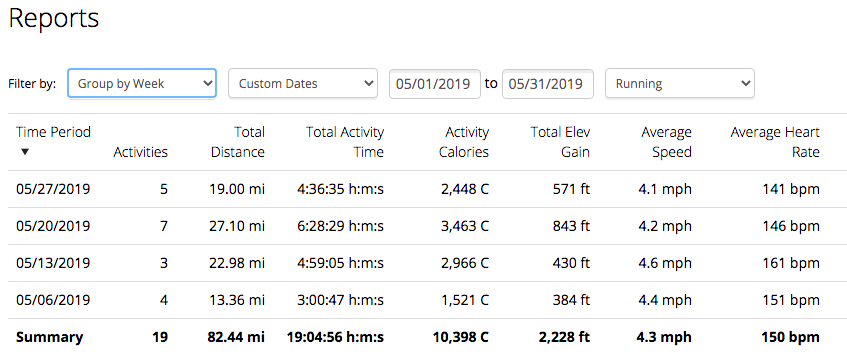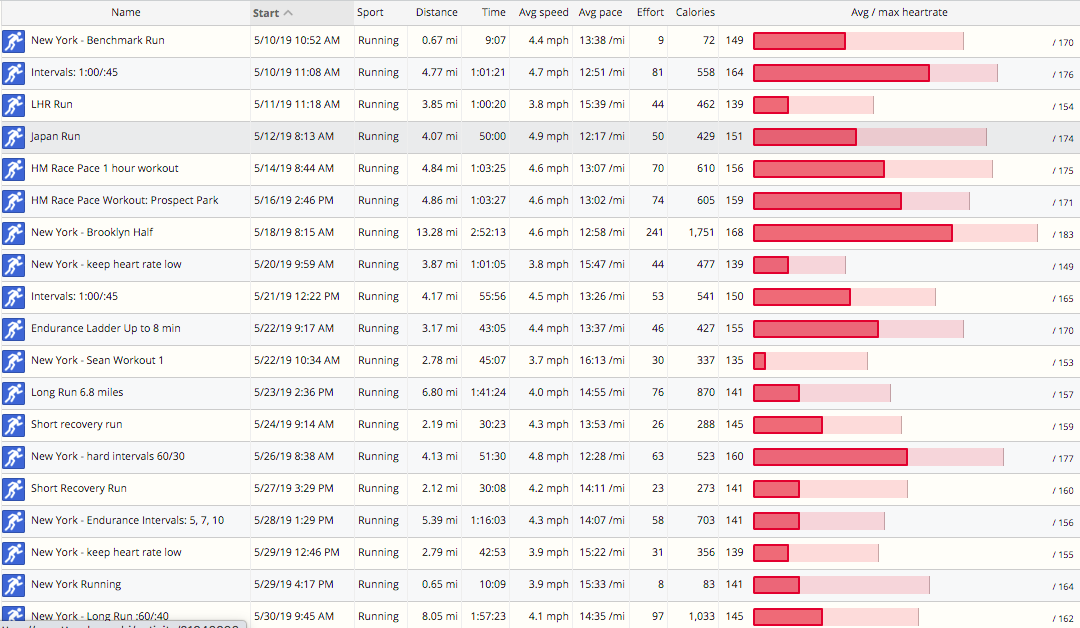How I lost 65 pounds by outrunning my bad diet ? and finding a better life.


As you can see, I was also starting to rack up some serious calorie burns. In that first month, I burned 10,398 calories from running alone. That?s the equivalent of nearly 3 pounds of fat loss. This would have been an accomplishment regardless, but between May 1 and June 1, I lost 10.9 pounds.
I attribute the extra weight loss to three factors: 1) water weight loss; 2) overall increased activity; 3) natural regulation of my calorie intake. As you can see from the chart below, for the last three weeks of May, I was burning close to 3,000 calories/day. This meant that I could eat around 2,000 calories each day and still lose more than 2 pounds per week.
For me, trying to get the calories burned count on my watch to go up each day was far more satisfying than weighing my food and trying to shave calories off my meals.
By June, I was running 100 miles per month and burning close to 14,000 calories ? the equivalent of 4 pounds of fat ? from running alone. That month I lost 9.5 pounds. After those two months, the weight loss started to slow down to a more steady pace.
But by that point, something had changed in me. A runner had been born and I was on a path to a lasting lifestyle change.
Making the most of the first two months
Many people who are trying to lose weight will be elated by the rapid weight loss of the first month or two of any fitness or diet regimen, but then become frustrated and disillusioned when things slow down. A common response to this by experts and those dispensing advice is to downplay the importance of that weight loss.
Both are wrong. Instead, it is most useful to think of this period as a jump start. The tremendous changes that take place can provide a solid foundation so long as you are prepared for the long haul. Motivation levels are high at the beginning of any new activity, and the key is to use this time to develop habits and mindsets that set you up for long-term success.
Rather than focus on dieting, this is the time to start to think of yourself as a runner. Start to think about your eating patterns and the kinds of foods that will give you energy for your runs. Make sure you are getting sufficient sleep and recovery. Taking care of your body in this way lowers your stress hormones and tells it that it is safe to let go of stored fat reserves.
I started a yoga routine during this period and tried to go to a yoga flow class 2?3 times/week. This did not burn a lot of calories, but it helped me to feel strong and limber and aided in injury prevention. I also found myself walking more places ? visiting the farmers? market for fresh fruits and vegetables, walking to the running shop to check out gear.
The self-esteem boost that comes from developing an identity as a runner far outweighs the extra 400 or 500 calories you might save by religiously tracking your dietary intake. You start to see your body as a source of strength and something capable of doing amazing things ? rather than as an enemy that is holding you hostage. If you?ve struggled with food issues, this can begin to transform your relationship to food.
Your goals begin to shift when you become a runner
While I was elated that I was finally losing weight ? and with so much ease ? I also noticed that my goals had started to change. Somewhere during those first two months, I began to care less about how quickly I lost the weight and more about my progress as a runner.
I had multiple apps that I used to track my progress. I became somewhat obsessed with tracking the improvement in my pace and I loved being able to run at the same pace at a lower heart rate. Once you are running over 20 miles/week, you start to develop your stamina and pace quite quickly. In a wonderful feedback loop, your lower weight makes running feel easier. And as you are able to run more, you are able to continue losing weight.

I?ll never forget the day that I had promised myself a Shake Shack milkshake after a long run. I had discovered this joy after a particularly brutal 14-mile long run. Feeling shaky and weak, I stopped for one of their milkshakes and drank it in a few gulps.
As I felt the icy cold going down my throat, I began to revive. Within a few minutes, I had fully recovered. My legs were steady, my breathing had slowed and my brain, which had felt dizzy, was alert. That moment provided a direct link between the quick carbs provided by the milkshake and my body?s needs after having its energy stores thoroughly depleted. I had earned that milkshake in the most real sense.
With that experience imprinted in my brain, I had looked forward to another after my next long run. However, as I walked towards the Shake Shack, the salad bar next door had a display out. All of a sudden, I found myself craving a salad. The milkshake had no hold over me. I abandoned it and chose, without hesitation or regret, a salad of crisp greens and vegetables, tangy cheese, a vinegar filled dressing and the crunch of croutons.
That was the moment I knew that I had indeed altered my relationship to food. I could see that both the milkshake and the salad were fuel for my body?s work. And I could trust my body?s signals ? finely tuned over months of work and attention ? to guide me in a way they never had before.
Patience is key ? learn to play the long game
Even if you follow all of this advice, you will find that weight loss slows over time. This is natural. Your body has to adjust to each new phase it goes through. As you become lighter, you have less excess weight to shed and have to work a little harder to lose it.
But in my experience, becoming a runner inspired the cascade of changes that guaranteed continued weight loss. It took me almost a year to lose 65 pounds ? and I?d still like to lose another 20?30. After the first few months, my weight loss slowed to about 4?5 pounds per week for several more months. Now I lose between .5 and 2 pounds each month.
But I am also not focused on the weight loss anymore. I am confident that it will come naturally. I don?t have a rock hard bikini body ? and don?t think I ever will. I?m a 48-year old mother of two and I love food. I have no interest in doing the work and making the sacrifices that would entail. But I am happy with my body.
I haven?t just lost weight ? going from a size 18 to a size 10 in less than a year. I?ve become a better, happier, more confident version of myself. Many people who have lost a lot of weight report feelings of loss when they reach their goals. They discover that weight loss alone can?t change some of the feelings inside and the focus on it has hidden other work that needed to be done.
By focusing on running as my key to weight loss, I set myself up to change my inner image of myself as my image to the world changed. Weight loss was no longer a destination I was trying to reach. It became one part of a much larger journey that doesn?t have an endpoint.
There are many ways to approach your body and your weight loss or fitness journey and I am not here to tell anyone how to live their life. If something else is working for you, by all means, do it and celebrate your success. But I see too many people failing and becoming discouraged because the prescriptions don?t fit them.
I offer up this story as encouragement that there are other ways to reach your goals. If you find yourself wanting to know more, or have specific questions, please don?t hesitate to reach out and ask me. I am happy to share any aspect of this experience and any lessons I?ve learned. I wish for everyone to discover the life-changing joy that running can bring.